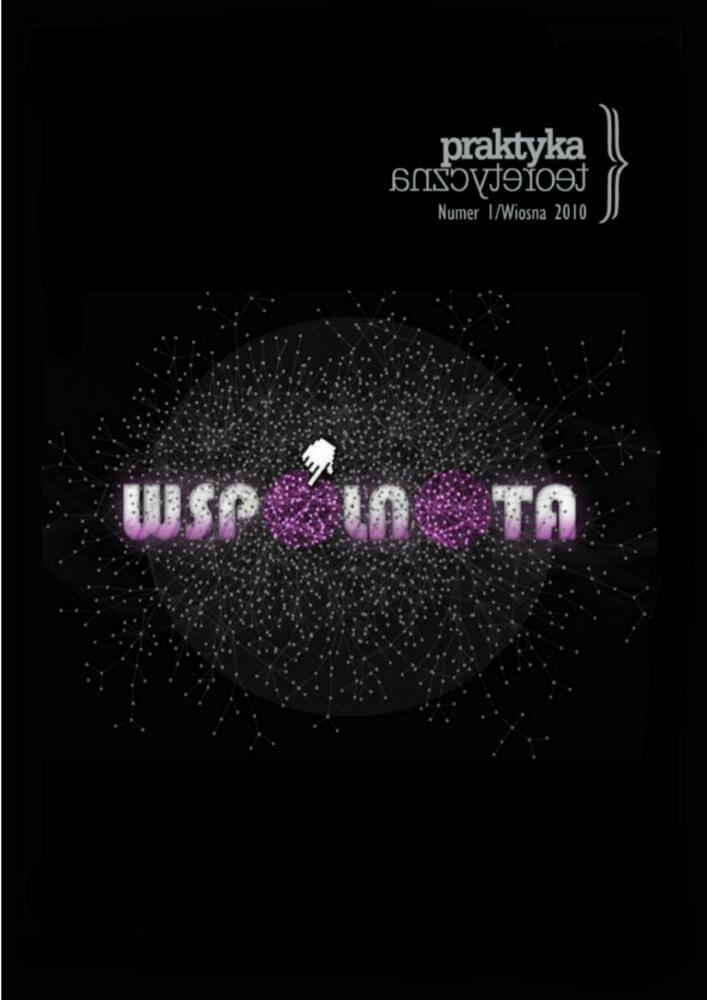Abstrakt
Niniejszy artykuł jest próbą rekonstrukcji pojęcia wielości, które przewija się przez prace Antonia Negriego, Michaela Hardta oraz Paolo Virno. Pojęcie to odnosi się do wyłonienia się nowego społecznego podmiotu, istotnie różnego od znanych historycznych sformułowań (narodu, ludu, klasy). Zostało ono zanalizowane zarówno w kontekście klasycznej filozofii politycznej, jak również zmian sposobów produkcji zachodzących w społeczeństwach Zachodu – przejścia od pracy materialnej do niematerialnej, na którą składa się wytwarzanie relacji między społecznymi poedynczościami. Perspektywa genealogiczna została uzupełniona przez analizę biopolitycznej konstytucji wielości, obie zaś ukażą naglącą potrzebę zdeonstruowania licznych pojęć tradycyjnej filozofii.
Bibliografia
Agamben G. 2000. Marginal Notes on „Commentaries on the Society of the Spectacle”. In Means without End: Notes on Politics. Minneapolis: University of Minnesota Press.
Agamben. G. 2008. Homo sacer: suwerenna władza i nagie życie. Warszawa: Prószyński i S-ka.
Alighieri D. 1957. On World-Government. New York.
Althusser L. 2009. Sprzeczność i naddeterminacja: notatki do przyszłych badań. W W imię Marksa. Warszawa: Wydawnictwo Krytyki Politycznej.
Baudrillard J. 2006. Wojny w Zatoce nie było. Warszawa: Sic!
Bowring F. 2004. „From the Mass Worker to the Multitude: a Theoretical Contextualization of Hardt and Negri’s Empire”. Capital & Class 28 (2) : 101-132.
Braidotti R. 2003. “Les Sujets Nomades Féministes Comme Figure des Multitudes”. Multitudes 12 (2) : 27-38.
Castells M., Himanen P. 2009. Społeczeństwo informacyjne i państwo dobrobytu: model fiński. Warszawa: Wydawnictwo Krytyki Politycznej.
Christofolini P. 2008. “Populus. Plebs. Multitudo: Nota Lessicale su Alcuni interscambi e Fluttuazioni di Significato da Livio e Macchiavelli a Spinoza”. Laboratorio dell’ISPF. 5 (1) : 28-31.
Cyceron M. 1999. O państwie. O prawach. Kęty: Wydawnictwo Marek Derewiecki.
Deleuze G. 2007. Postscriptum o społeczeństwie kontroli. W Negocjacje: 1972-1990. Wrocław: Wydawnictwo Naukowe Dolnośląskiej Szkoły Wyższej Edukacji TWP.
E. Bendyk. 2009. Miłość. wojna. rewolucja: szkice na czas kryzysu. Warszawa: W.A.B..
Foucault M. 1995. Wola wiedzy. W Historia seksualności. Warszawa: Czytelnik.
Foucault M. 1998. Trzeba bronić społeczeństwa: wykłady w Collège de France 1976. Warszawa: Aletheia.
Foucault M. 2000. Rządomyślność. W Filozofia. historia. polityka: wybór pism. Warszawa: Wydawnictwo Naukowe PWN.
Foucault M. 2004. The Birth of Biopolitics: Lectures at the Collège de France 1979. New York: Picador.
Hardt M., Negri A. 1994. Labor of Dionysus: a Critique of the State-Form. Minneapolis: University of Minnesota Press.
Hardt M., Negri A. 2005. Imperium. Warszawa: W.A.B..
Hardt M., Negri A. 2005. Multitude: War and Democracy in the Age of Empire. London: Penguin Books.
Herer M. 2006. Gilles Deleuze: struktury-maszyny-kreacje. Kraków: Universitats.
Lazzarato M. 1996. Immaterial Labor. W Radical Thought in Italy: a Potential Politics. Minneapolis: University of Minnesota Press.
Lemke T. 2008. Gouvernmentalität und Biopolitik. Wiesbaden: VS Verlag für Sozialwissenschaften.
Lotringer S. 2004. We, the Multitude. W A Grammar of the Multitude. New York: Semiotext(e).
Macchiavelli N. 1993. Discorsi Sopra la Prima Deca di Tito Livio. Torino.
Mentinis M. 2006. Zapatistas: The Chiapas Revolt and What It Meant for Radical Politics London Pluto Press.
Negri A. 1992. Il potere constituente: Saggio Sulle Alterntive del Moderne. Carnago.
Negri A. 2006. Powrót: alfabet biopolityczny. Warszawa: Sic!.
Negri A. 2007. Zur Gesellschaftlichen Ontologie: Materielle Arbeit. Immaterielle Arbeit und Biopolitik. W Empire und die Biopolitische Wende: die Internationale Disskusion im Anschluss an Hardt und Negri. Frankfurt-New York.
Preciado B. 2003. “Multitudes Queer: Notes pour Une Politique des Aanormaux”. Multitudes 12 (2) : 17-25.
Tronti M. 2005. The Strategy of Refusal. http://libcom.org/library/strategy-refusalmario-Tronti.
Virno P. 1996. Virtuosity and Revolution: the Political Theory of Exodus. W Radical Thought in Italy. Minneapolis: University of Minnesota Press.
Licencja
Autorzy:
„Praktyka Teoretyczna” jest pismem, które chce realizować idee wolnego dostępu do wiedzy i poszerzania domeny dobra wspólnego. Ma służyć rozwojowi nauki i krytycznej refleksji w Polsce i na świecie w imię idei wolnego dostępu do wiedzy (Open Access). Całe pismo jest udostępniane za darmo w Internecie na warunkach licencji CC-BY-NC-SA (Uznanie autorstwa-Użycie niekomercyjne-Na tych samych warunkach 4.0 Międzynarodowe) w wersji 4.0 (szczegółowe warunki: http://creativecommons.org/licenses/by-nc-sa/4.0/). Artykuły w nim zamieszczone mogą być dowolnie przechowywane, kopiowane, drukowane, rozpowszechniane i wykorzystywane do celów naukowo-dydaktycznych przy zachowaniu warunków licencji. Apelujemy tylko o uznanie autorstwa i podanie źródła w myśl przyjętych w środowisku naukowym standardów.
Nie ma natomiast możliwości komercyjnego wykorzystania zgromadzonych zasobów bez pisemnej zgody wydawcy. Dostęp do czasopisma nie może być dystrybuowany za opłatą czy w jakikolwiek inny sposób limitowany przez inne podmioty.
Autorzy tekstów przyjętych do publikacji w czasopiśmie „Praktyka Teoretyczna” są zobowiązani do wypełnienia, podpisania i odesłania na adres redakcji umowy o udzielenie nieodpłatnej licencji do utworów, z zobowiązaniem do udzielania sublicencji CC [PL.pdf, PL.doc, EN.pdf, EN.doc].
Zgodnie z umową, autorzy tekstów opublikowanych w czasopiśmie „Praktyka Teoretyczna” udzielają wydawcy czasopisma niewyłącznej i nieodpłatnej licencji oraz zezwalają na użycie sublicencji Creative Commons Uznanie autorstwa-Użycie niekomercyjne-Na tych samych warunkach 4.0 Międzynarodowe (CC-BY-NC-SA 4.0).
Autorzy zachowują prawa do dalszego, swobodnego rozporządzania utworem.
Autorzy nadsyłanych artykułów powinni upewnić się, czy wykorzystywane przez nich materiały nie są chronione prawami autorskimi na rzecz innych osób i ponoszą odpowiedzialność za ewentualne uchybienia w tym względzie.
